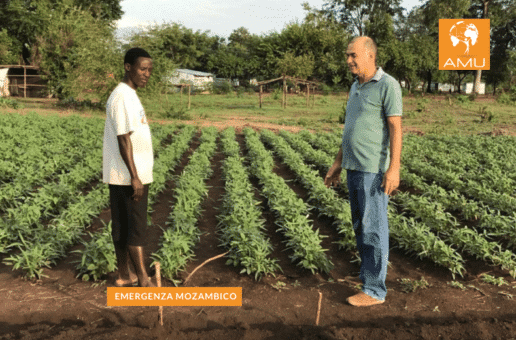
Dec 4, 2020 | Non categorizzato
Destroyed by the flood of 2019, the Fazenda has been rebuilt through the contribution of the Focolare Movement’s Emergency Coordination Team, Famiglie Nuove Association and Azione Mondo Unito. 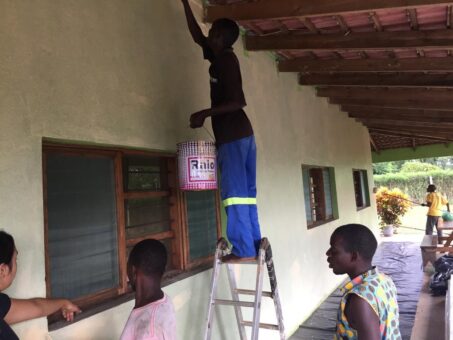 “It was really hard after the tragedy,” said Ildo Foppo, a Focolare Volunteer, who is responsible for the mission of the Fazenda da Esperança in Dombe, Mozambique, referring to the dramatic flood which struck the country in March 2019. “But at the same time we were sure everything that happened could give new life to these places and to this community,” he added, reflecting on the most precious fruits borne of this shared commitment to reconstruction. “The ties with the local Church have strengthened, as well as with the emergency aid organizations and the whole local community. We’ve met so many people and have received many promises of help.” The devastation and necessity to rebuild actually became an opportunity to create jobs for many people. “We formed several cooperatives, each composed of ten families. In this way many were enabled to earn their own living, and start to rebuild their own future”. Now, nearly two years after the flood, the collaboration between the Fazenda and the Focolare Movement’s Emergency Coordination Team, Famiglie Nuove Association and Azione Mondo Unito, has covered repairs to the nursery, the hospital, four hostels, the secondary school and the Church. Accommodation and service blocks have been completely rebuilt. A warehouse was made available for making the cement blocks required for the construction of family houses.
“It was really hard after the tragedy,” said Ildo Foppo, a Focolare Volunteer, who is responsible for the mission of the Fazenda da Esperança in Dombe, Mozambique, referring to the dramatic flood which struck the country in March 2019. “But at the same time we were sure everything that happened could give new life to these places and to this community,” he added, reflecting on the most precious fruits borne of this shared commitment to reconstruction. “The ties with the local Church have strengthened, as well as with the emergency aid organizations and the whole local community. We’ve met so many people and have received many promises of help.” The devastation and necessity to rebuild actually became an opportunity to create jobs for many people. “We formed several cooperatives, each composed of ten families. In this way many were enabled to earn their own living, and start to rebuild their own future”. Now, nearly two years after the flood, the collaboration between the Fazenda and the Focolare Movement’s Emergency Coordination Team, Famiglie Nuove Association and Azione Mondo Unito, has covered repairs to the nursery, the hospital, four hostels, the secondary school and the Church. Accommodation and service blocks have been completely rebuilt. A warehouse was made available for making the cement blocks required for the construction of family houses.  During the first phase of the emergency, food supplies were distributed to those who had lost their homes. 550 temporary shelters with latrines were also quickly built for the homeless families. Later a support programme was developed to promote sustainable income-generation for the population. In particular, 150 families received direct help with house repairs as well as the aquisition of seeds, fertilizer and tractor fuel to facilitate their return to agricultural production. In addition, a carpentry workshop was established which offers training and work to more than 60 young people staying at the Fazenda. And a mill was constsructed to serve around 330 families. These plans were completed despite all the recent pressures brought by Covid-19 to the country. For updates on this project and the region, click: Amu or Afn.
During the first phase of the emergency, food supplies were distributed to those who had lost their homes. 550 temporary shelters with latrines were also quickly built for the homeless families. Later a support programme was developed to promote sustainable income-generation for the population. In particular, 150 families received direct help with house repairs as well as the aquisition of seeds, fertilizer and tractor fuel to facilitate their return to agricultural production. In addition, a carpentry workshop was established which offers training and work to more than 60 young people staying at the Fazenda. And a mill was constsructed to serve around 330 families. These plans were completed despite all the recent pressures brought by Covid-19 to the country. For updates on this project and the region, click: Amu or Afn.
Claudia Di Lorenzi
If you want to make your contribution to help those suffering from the effects of the global Covid crisis, go to this link
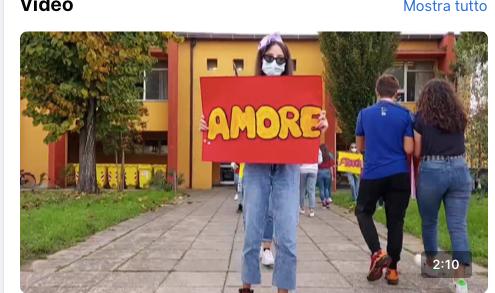
Dec 2, 2020 | Non categorizzato
Now in its eighth edition, even Covid could not stop the march that is part of the “Harmony Among Peoples” festival. We talk with Antonella Lombardo, artistic director of the Laboratorio Accademico Danza (LAD) dance school in Montecatini, Italy and promoter of the event. We have seen them in the most different places in these months of pandemic: pianists, violinists, rockers, pop and opera singers on the roofs, in the squares, in the parks, always keeping the right distance. It bears witness how nothing and no one can stop artistic expression, not even a worldwide virus. Antonella Lombardo is artistic director of the Laboratorio Accademico Danza school in Montecatini, near Florence, Italy. He’s also the creator of the Harmony Among Peoples festival that for 15 years has been promoting the idea of the search for possible harmony through art, as an inclusive and universal instrument. The 2020 edition did not stop with Covid. 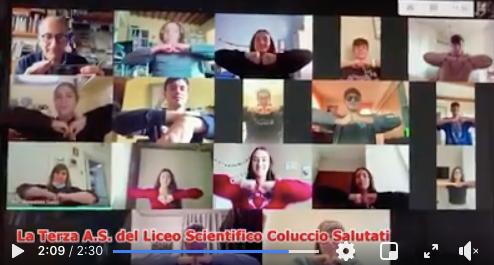 What shape did the festival take this year? The “Harmony for Peace” march is one of the main events of the “Harmony among Peoples” festival, and we knew that this year we were not going to be able to hold it in the traditional way. A virtual format was the only possibility, and so we launched it on 12 November. We invited schools in the area in which we are located, as well as beyond Italy, to make videos that express the meaning of peace. The response was incredible. Despite the fact that many schools in Italy now use, from a certain degree upwards, education at a distance, teachers supported the project, students responded enthusiastically, and everything took on a higher value, especially from the point of view of building relationships. The teachers collaborated with each other, and many classes made the videos that we posted on the DanceLab Armonia Cultural Association Facebook page. We received works not only from Italy, but also from other countries like France and Jordan. Thus an extremely varied digital marathon took shape and said “peace” in the most diverse artistic and choreographic formats.
What shape did the festival take this year? The “Harmony for Peace” march is one of the main events of the “Harmony among Peoples” festival, and we knew that this year we were not going to be able to hold it in the traditional way. A virtual format was the only possibility, and so we launched it on 12 November. We invited schools in the area in which we are located, as well as beyond Italy, to make videos that express the meaning of peace. The response was incredible. Despite the fact that many schools in Italy now use, from a certain degree upwards, education at a distance, teachers supported the project, students responded enthusiastically, and everything took on a higher value, especially from the point of view of building relationships. The teachers collaborated with each other, and many classes made the videos that we posted on the DanceLab Armonia Cultural Association Facebook page. We received works not only from Italy, but also from other countries like France and Jordan. Thus an extremely varied digital marathon took shape and said “peace” in the most diverse artistic and choreographic formats.  Of the material you received, was there something that touched you in a particular way? Why? We were struck first of all by the interactions among the kids. We don’t know where all this will lead, and the fact that they got together to work on what it means to build peace, today, is perhaps the most important thing. They had to come up with ideas with their teachers in order to make the videos. They went deep into the meaning of peace, and the fact that it is not a slogan. This made them have to dig into each other’s hearts. Even the civil servants from towns in our area who saw the early beginnings and growth of the “Harmony Among Peoples” festival were enthusiastic and told us that it was one of the most beautiful activities of their lives. In short, these relationships are the most beautiful fruit: true relationships, based on relationships built on our common good. What projects are you working on now? In collaboration with the Custody of the Holy Land, particularly with the support of Fr. Ibrahim Faltas and the John Paul II Foundation, we are working to create a dance school in Bethlehem. This project hopes to be a glimmer of hope and give dignity to so many children in these territories, who are prisoners in the open air. Another project is an international campus for dance, which will be based in Italy but be international. It will be a training centre where art will become a tool to break any kind of barrier – a place for all young people who want to leave their mark and use this language to bring beauty everywhere, even where it seems impossible.
Of the material you received, was there something that touched you in a particular way? Why? We were struck first of all by the interactions among the kids. We don’t know where all this will lead, and the fact that they got together to work on what it means to build peace, today, is perhaps the most important thing. They had to come up with ideas with their teachers in order to make the videos. They went deep into the meaning of peace, and the fact that it is not a slogan. This made them have to dig into each other’s hearts. Even the civil servants from towns in our area who saw the early beginnings and growth of the “Harmony Among Peoples” festival were enthusiastic and told us that it was one of the most beautiful activities of their lives. In short, these relationships are the most beautiful fruit: true relationships, based on relationships built on our common good. What projects are you working on now? In collaboration with the Custody of the Holy Land, particularly with the support of Fr. Ibrahim Faltas and the John Paul II Foundation, we are working to create a dance school in Bethlehem. This project hopes to be a glimmer of hope and give dignity to so many children in these territories, who are prisoners in the open air. Another project is an international campus for dance, which will be based in Italy but be international. It will be a training centre where art will become a tool to break any kind of barrier – a place for all young people who want to leave their mark and use this language to bring beauty everywhere, even where it seems impossible.
Stefania Tanesini
Dec 1, 2020 | Non categorizzato
His Holiness Bartholomew I, Ecumenical Patriarch of Constantinople came to the Focolare Movement’s international centre on 20 October, where he visited the tomb of Chiara Lubich. He met representatives of the Movement’s General Council. This is the transcript of his address.
Homily of his Holiness Bartholomew, Archbishop of Constantinople – New Rome,
and Ecumenical Patriarch, for the Centenary of the birth of Chiara Lubich
Rocca di Papa-Rome, 20th October 2020
Dear Maria Voce, Emmaus, President of the Focolare Movement, Your Eminences, Your Excellencies, Beloved brothers and sisters in the Lord, With great joy we have accepted the invitation to come here at the end of this journey to the Eternal City, Ancient Rome, to Rocca di Papa, where our beloved Chiara is resting, awaiting the Resurrection. It is particularly significant that we come in the centenary year of her birth – Chiara was, in fact, born in 1920 – to pay homage to her and to express our thanks to the Lord of life for having granted her to us for so long, but above all for having flooded her with his dazzling grace, expressed in the phrase that reminds us of her here: “And we have believed in Love”. The Love in which she believed and in which she grafted her whole life does not belong to this world, but did become incarnate in the world so that we could experience Him, so that we could know Him, so that we could meet Him in our brothers and sisters, everywhere in the world; so that we could taste Him, becoming one with Him, in the Holy and Divine Eucharist. How many other things our Chiara would have done if she were still among us! But it is not the years that give meaning to life, it is not the quantity, the length, but how we use the talents that He has offered us. It is the quality of life, spent to bear witness to Him who is Life. If we think, for example, of St Basil of Caesarea, the great Father of the Church, the first of the Cappadocian Fathers, he had a very short life, not even fifty years. And yet that short life, offered entirely to the Lord, produced theological, liturgical, dogmatic and ascetic works, which “bear unmistakable traces of his pen, his mind and his heart”. He was a forerunner in caring for the poor and suffering, building a little city of charity with inns, hospices and a leprosarium, called the Basiliad: it was the first hospital in history. He also took care of nature and animals, about which modern themes emerge in his famous prayer dedicated to animals. If in such a few years St Basil did such works, it is because he had completely filled his whole life with Love for Christ, giving him his breath of every moment to the point of giving his soul to God, much tried by austerities, illnesses and worn out by worries. Our Chiara lived a longer life, but in the same way she left us a legacy on which we must meditate much still. She left us the charism of unity at all levels. She lived it, experienced it, spent all her strength on it and taught everyone to play their role in society in the best way possible. We can safely say that Chiara took on this commitment to fraternity, unity and peace in all areas of human life, giving us a message through her life and her writings that we cannot ignore. The Movement and all the works that exist today, thanks to her charism, are the witness of a life spent for the Lord, which has also passed through the Cross, but was always aimed at the Resurrection. After Chiara, the helm then passed to a very dear sister of ours, whose friendship with us and with our Ecumenical Patriarchate is long and steadfast, since the years of her stay in Constantinople, where she truly left an indelible mark of the ministry of fraternity, unity and love for all: Maria Voce-Emmaus. Taking on Chiara’s mantle, during these years Maria Voce has known how to be like the good servant in the Parable of the Talents. She did not hide the talent underground, but she made it fruitful again and again, and her Lord will certainly know how to show his gratitude to her. Having reached the end of your term as President, we also wish to thank you for your great contribution to this work; the memory we have of you, like all of you, is in our heart, and you will certainly continue the charism, wherever the Lord will call you. May God, in His immense mercy, grant this work that is pleasing to Him, a worthy successor, who is once again able to surprise and amaze us and all of you, to enlighten every people in the world with the power of Love that overcomes all things, because “to love, the Christian must do as God does: not wait to be loved, but be the first to love”. (Cit. Chiara Lubich). May the grace of our Lord Jesus Christ, the love of God the Father and the fellowship of the Holy Spirit be with you all. Read also the article about the Patriarch’s visit to the International Focolare Centre
Nov 30, 2020 | Non categorizzato
When Chiara Lubich spoke of suffering and pain, she did not limit herself to a philosophical, psychological or spiritual concept. She always looked towards the person she called the “spouse of her soul”, Jesus, at the moment when on the cross he experienced being forsaken by the Father and cried out, “My God, my God, why have you forsaken me?” (Mt 27:46). In her deep and mysterious relationship with Him she found the strength to accept every suffering and transform it into love. We would die if we did not look at you, who transformed, as if by magic, every bitterness into sweetness; at you, crying out on the cross, in the greatest suspense, in total inactivity, in a living death, when, sunk in the cold, you hurled your fire upon the earth, and reduced to infinite stillness, you cast your infinite life to us, who now live it in rapture. It is enough for us to see that we are like you, at least a little, and unite our suffering to yours and offer it to the Father. So that we might have Light, you ceased to see. So that we might have union, you experienced separation from the Father. So that we might possess wisdom, you became “ignorance.” So that we might be clothed with innocence, you made yourself “sin.” So that God might be in us, you felt him far from you.
Chiara Lubich
Essential Writings, New City Press, 2007 p. 9
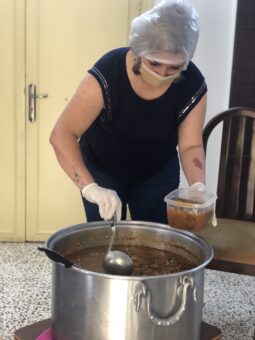
Nov 28, 2020 | Non categorizzato
In two cities on the Syrian coast, a group of volunteers from the Focolare Movement is promoting a project that provides nutritious meals for elderly or disadvantaged people and families in need. 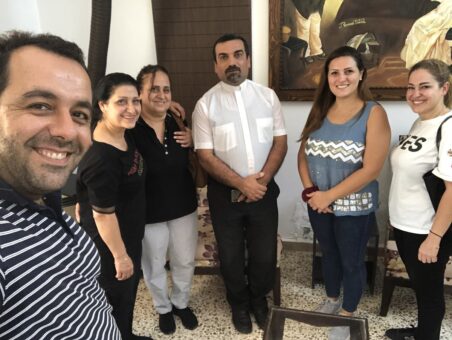 “Working in a team made me feel that God is close to us; in addition, this collective commitment has made us one family.” This is what Hazem said about her experience of being involved in the “Lokmat Mahaba” project. In Arabic this means “a morsel of love”. The initiative, promoted by the Focolare Movement and supported with funds from AMU (Action for a United World) Syria Emergency provides support for families in need who are living in the cities of al-Kafroun and Mashta al-Helou, in north-west Syria. Christians of different denominations work together for this project. “Lokmat Mahaba” operates in a context marked by economic crisis, a very high level of tension and conflict, severe restrictions imposed by the EU and the United States, the depreciation of the Syrian lira and a decrease in life expectancy for the inhabitants in the area. Furthermore, the covid pandemic has exacerbated the already difficult situation. Nonetheless, the small group of volunteers offers help to about twenty families made up of displaced persons and residents who are facing many economic and health challenges. The volunteers offer their time and energy. Some even offer the fruits of their land. Others make a small but significant economic contribution.
“Working in a team made me feel that God is close to us; in addition, this collective commitment has made us one family.” This is what Hazem said about her experience of being involved in the “Lokmat Mahaba” project. In Arabic this means “a morsel of love”. The initiative, promoted by the Focolare Movement and supported with funds from AMU (Action for a United World) Syria Emergency provides support for families in need who are living in the cities of al-Kafroun and Mashta al-Helou, in north-west Syria. Christians of different denominations work together for this project. “Lokmat Mahaba” operates in a context marked by economic crisis, a very high level of tension and conflict, severe restrictions imposed by the EU and the United States, the depreciation of the Syrian lira and a decrease in life expectancy for the inhabitants in the area. Furthermore, the covid pandemic has exacerbated the already difficult situation. Nonetheless, the small group of volunteers offers help to about twenty families made up of displaced persons and residents who are facing many economic and health challenges. The volunteers offer their time and energy. Some even offer the fruits of their land. Others make a small but significant economic contribution.  They are not the only people who sustain his project. People living in other nearby villages, university lecturers and people who give small donations all play their role. This means that it is possible to prepare and deliver one meal a week to each family. The volunteers take the food to the house just before lunchtime. Referring to these visits, Micheline said, “Those few minutes in which we stand with each family while they share the food help us to enter into their world. The prayers that we listen to and the relationships we are building are the real treasure of the project.” And what a joy it is to participate in the enthusiasm of the children – and of those who have not been children for a long time – who anxiously await that “morsel of love”: “Sharing everyday concerns and being with them as one” keep the enthusiasm and commitment alive in everyone. The volunteers have said that the strength to carry on this work comes from receiving the Eucharist and from sharing moments of prayer. One year after the start of the project, in September 2019, the group of volunteers and collaborators has grown and Father Gandhi Muhanna, pastor of the Maronite Church, has offered the use of the kitchen in his home for the preparation of meals. It is difficult to prepare healthy and nutritious meals, from good quality ingredients that are often difficult to find, while food prices continue to rise. However, none of the volunteers are backing down from this challenge: the aim is to develop the project, expand the network of co-workers, increase the quality and frequency of meals, but above all reach a growing number of families and people in need and to “use all means possible to share the gifts that each one has received from God.”
They are not the only people who sustain his project. People living in other nearby villages, university lecturers and people who give small donations all play their role. This means that it is possible to prepare and deliver one meal a week to each family. The volunteers take the food to the house just before lunchtime. Referring to these visits, Micheline said, “Those few minutes in which we stand with each family while they share the food help us to enter into their world. The prayers that we listen to and the relationships we are building are the real treasure of the project.” And what a joy it is to participate in the enthusiasm of the children – and of those who have not been children for a long time – who anxiously await that “morsel of love”: “Sharing everyday concerns and being with them as one” keep the enthusiasm and commitment alive in everyone. The volunteers have said that the strength to carry on this work comes from receiving the Eucharist and from sharing moments of prayer. One year after the start of the project, in September 2019, the group of volunteers and collaborators has grown and Father Gandhi Muhanna, pastor of the Maronite Church, has offered the use of the kitchen in his home for the preparation of meals. It is difficult to prepare healthy and nutritious meals, from good quality ingredients that are often difficult to find, while food prices continue to rise. However, none of the volunteers are backing down from this challenge: the aim is to develop the project, expand the network of co-workers, increase the quality and frequency of meals, but above all reach a growing number of families and people in need and to “use all means possible to share the gifts that each one has received from God.”
Claudia Di Lorenzi
If you want to make your contribution to help those suffering from the effects of the global Covid crisis, go to this link
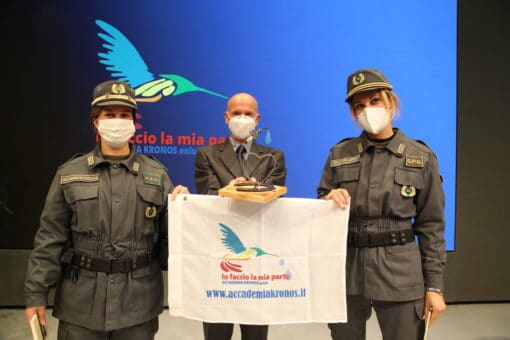
Nov 26, 2020 | Non categorizzato
The Focolare Movement received the “I do my part” international award from the Kronos Academy for its commitment in favour of our planet through its ecological initiative by EcoOne. Pope Francis and Thor Heyerdahl, the Norwegian explorer and anthropologist are also among the winners of the 2020 edition. The latter received the award posthumously. 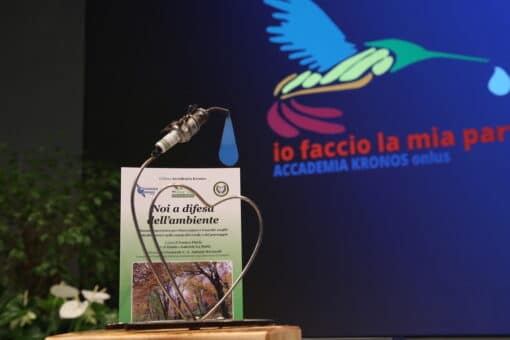 An old African tale relates that during a forest fire a hummingbird, the smallest of birds, flew towards the fire while all other animals fled away from it. When the lion asked the hummingbird about its behaviour, the bird with a drop of water on its beak, replied: “I’m doing my part!”. The international award, assigned by the Kronos Academy takes its name from this story. It has now reached its fourth edition, and it is rewarded annually to people, entities and nations that “do their part” in favour of the environment and the earth’s climate. Among the eight winners of this edition, there is also EcoOne, the Focolare international initiative promoted by a network of lecturers, academics, researchers and professionals who perform in environmental sciences and strive to enrich their scientific knowledge through a profound humanistic reading of contemporary ecological problems (www.ecoone.org).
An old African tale relates that during a forest fire a hummingbird, the smallest of birds, flew towards the fire while all other animals fled away from it. When the lion asked the hummingbird about its behaviour, the bird with a drop of water on its beak, replied: “I’m doing my part!”. The international award, assigned by the Kronos Academy takes its name from this story. It has now reached its fourth edition, and it is rewarded annually to people, entities and nations that “do their part” in favour of the environment and the earth’s climate. Among the eight winners of this edition, there is also EcoOne, the Focolare international initiative promoted by a network of lecturers, academics, researchers and professionals who perform in environmental sciences and strive to enrich their scientific knowledge through a profound humanistic reading of contemporary ecological problems (www.ecoone.org). 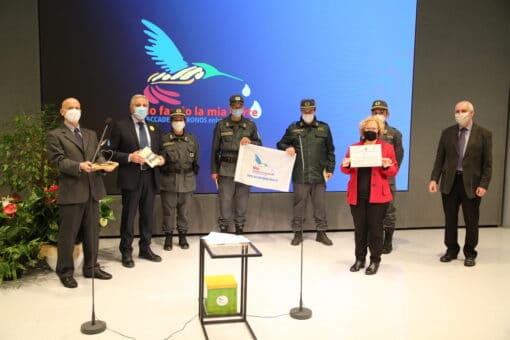 Due to the pandemic, the award ceremony could not be held, as scheduled, at the Protomoteca Hall of the Campidoglio in Rome. The Focolare Movement received its reward on Thursday, 26 November 2020, at its international headquarters in Rocca di Papa, Rome from Vincenzo Avalle, member of the National Board of the Kronos Academy, who was accompanied by Armando Bruni, the Coordinator for the Academy in Central Italy and three environmental officers. Prof. Luca Fiorani, President of EcoOne received the award on behalf of the Focolare Movement. He was presented with a sculpture of a hummingbird, made of recycled metal by the artist Renato Mancini, and an award certificate. “This award is meant to stimulate, to motivate all those who are committed to protect the environment”, explained Vincenzo Avalle, while he continued: “I was struck by the complex Focolare activity in favour of the environment as expressed by EcoOne, supported by science and interaction with politics”.
Due to the pandemic, the award ceremony could not be held, as scheduled, at the Protomoteca Hall of the Campidoglio in Rome. The Focolare Movement received its reward on Thursday, 26 November 2020, at its international headquarters in Rocca di Papa, Rome from Vincenzo Avalle, member of the National Board of the Kronos Academy, who was accompanied by Armando Bruni, the Coordinator for the Academy in Central Italy and three environmental officers. Prof. Luca Fiorani, President of EcoOne received the award on behalf of the Focolare Movement. He was presented with a sculpture of a hummingbird, made of recycled metal by the artist Renato Mancini, and an award certificate. “This award is meant to stimulate, to motivate all those who are committed to protect the environment”, explained Vincenzo Avalle, while he continued: “I was struck by the complex Focolare activity in favour of the environment as expressed by EcoOne, supported by science and interaction with politics”.  When Fioriani received the award, he said: “I can see a great synergy between the Kronos Academy and the Focolare/EcoOne, because we are complementary: Kronos originates from action, EcoOne from reflection. We need one another. The Focolare Movement can contribute to different areas of cultural depth, especially economy and politics, both decisive for the environment. We can also offer our international experience”. He added: “I see a possibility of collaboration, of very strong synergy. There are so many entities that work for the environment. I think it’s time that all these organizations pool their work together”. The Kronos Academy (www.accademiakronos.it) continues with the work and spirit of “Kronos 1991”, one of the first environmental organisations that was set up. With about 10,000 members in Italy and international offices and references, it is committed to protect the environment and quality of life. In collaboration with Scientific Institutes and Universities, Kronos offers a degree course for “Environmental Educator and Disseminator” and two masters degree courses in “Health and Environment”, and it supports a supervisory body for environmental prevention and information. But above all it invites people the world over to “do their part” to safeguard the environment.
When Fioriani received the award, he said: “I can see a great synergy between the Kronos Academy and the Focolare/EcoOne, because we are complementary: Kronos originates from action, EcoOne from reflection. We need one another. The Focolare Movement can contribute to different areas of cultural depth, especially economy and politics, both decisive for the environment. We can also offer our international experience”. He added: “I see a possibility of collaboration, of very strong synergy. There are so many entities that work for the environment. I think it’s time that all these organizations pool their work together”. The Kronos Academy (www.accademiakronos.it) continues with the work and spirit of “Kronos 1991”, one of the first environmental organisations that was set up. With about 10,000 members in Italy and international offices and references, it is committed to protect the environment and quality of life. In collaboration with Scientific Institutes and Universities, Kronos offers a degree course for “Environmental Educator and Disseminator” and two masters degree courses in “Health and Environment”, and it supports a supervisory body for environmental prevention and information. But above all it invites people the world over to “do their part” to safeguard the environment.
Joachim Schwind

 “It was really hard after the tragedy,” said Ildo Foppo, a Focolare Volunteer, who is responsible for the mission of the Fazenda da Esperança in Dombe, Mozambique, referring to the dramatic flood which struck the country in March 2019. “But at the same time we were sure everything that happened could give new life to these places and to this community,” he added, reflecting on the most precious fruits borne of this shared commitment to reconstruction. “The ties with the local Church have strengthened, as well as with the emergency aid organizations and the whole local community. We’ve met so many people and have received many promises of help.” The devastation and necessity to rebuild actually became an opportunity to create jobs for many people. “We formed several cooperatives, each composed of ten families. In this way many were enabled to earn their own living, and start to rebuild their own future”. Now, nearly two years after the flood, the collaboration between the Fazenda and the Focolare Movement’s Emergency Coordination Team, Famiglie Nuove Association and Azione Mondo Unito, has covered repairs to the nursery, the hospital, four hostels, the secondary school and the Church. Accommodation and service blocks have been completely rebuilt. A warehouse was made available for making the cement blocks required for the construction of family houses.
“It was really hard after the tragedy,” said Ildo Foppo, a Focolare Volunteer, who is responsible for the mission of the Fazenda da Esperança in Dombe, Mozambique, referring to the dramatic flood which struck the country in March 2019. “But at the same time we were sure everything that happened could give new life to these places and to this community,” he added, reflecting on the most precious fruits borne of this shared commitment to reconstruction. “The ties with the local Church have strengthened, as well as with the emergency aid organizations and the whole local community. We’ve met so many people and have received many promises of help.” The devastation and necessity to rebuild actually became an opportunity to create jobs for many people. “We formed several cooperatives, each composed of ten families. In this way many were enabled to earn their own living, and start to rebuild their own future”. Now, nearly two years after the flood, the collaboration between the Fazenda and the Focolare Movement’s Emergency Coordination Team, Famiglie Nuove Association and Azione Mondo Unito, has covered repairs to the nursery, the hospital, four hostels, the secondary school and the Church. Accommodation and service blocks have been completely rebuilt. A warehouse was made available for making the cement blocks required for the construction of family houses.  During the first phase of the emergency, food supplies were distributed to those who had lost their homes. 550 temporary shelters with latrines were also quickly built for the homeless families. Later a support programme was developed to promote sustainable income-generation for the population. In particular, 150 families received direct help with house repairs as well as the aquisition of seeds, fertilizer and tractor fuel to facilitate their return to agricultural production. In addition, a carpentry workshop was established which offers training and work to more than 60 young people staying at the Fazenda. And a mill was constsructed to serve around 330 families. These plans were completed despite all the recent pressures brought by Covid-19 to the country. For updates on this project and the region, click: Amu or Afn.
During the first phase of the emergency, food supplies were distributed to those who had lost their homes. 550 temporary shelters with latrines were also quickly built for the homeless families. Later a support programme was developed to promote sustainable income-generation for the population. In particular, 150 families received direct help with house repairs as well as the aquisition of seeds, fertilizer and tractor fuel to facilitate their return to agricultural production. In addition, a carpentry workshop was established which offers training and work to more than 60 young people staying at the Fazenda. And a mill was constsructed to serve around 330 families. These plans were completed despite all the recent pressures brought by Covid-19 to the country. For updates on this project and the region, click: Amu or Afn. 

 What shape did the festival take this year? The “Harmony for Peace” march is one of the main events of the “Harmony among Peoples” festival, and we knew that this year we were not going to be able to hold it in the traditional way. A virtual format was the only possibility, and so we launched it on 12 November. We invited schools in the area in which we are located, as well as beyond Italy, to make videos that express the meaning of peace. The response was incredible. Despite the fact that many schools in Italy now use, from a certain degree upwards, education at a distance, teachers supported the project, students responded enthusiastically, and everything took on a higher value, especially from the point of view of building relationships. The teachers collaborated with each other, and many classes made the videos that we posted on the DanceLab Armonia Cultural Association Facebook page. We received works not only from Italy, but also from other countries like France and Jordan. Thus an extremely varied digital marathon took shape and said “peace” in the most diverse artistic and choreographic formats.
What shape did the festival take this year? The “Harmony for Peace” march is one of the main events of the “Harmony among Peoples” festival, and we knew that this year we were not going to be able to hold it in the traditional way. A virtual format was the only possibility, and so we launched it on 12 November. We invited schools in the area in which we are located, as well as beyond Italy, to make videos that express the meaning of peace. The response was incredible. Despite the fact that many schools in Italy now use, from a certain degree upwards, education at a distance, teachers supported the project, students responded enthusiastically, and everything took on a higher value, especially from the point of view of building relationships. The teachers collaborated with each other, and many classes made the videos that we posted on the DanceLab Armonia Cultural Association Facebook page. We received works not only from Italy, but also from other countries like France and Jordan. Thus an extremely varied digital marathon took shape and said “peace” in the most diverse artistic and choreographic formats. 
 “Working in a team made me feel that God is close to us; in addition, this collective commitment has made us one family.” This is what Hazem said about her experience of being involved in the “Lokmat Mahaba” project. In Arabic this means “a morsel of love”. The initiative, promoted by the Focolare Movement and supported with funds from
“Working in a team made me feel that God is close to us; in addition, this collective commitment has made us one family.” This is what Hazem said about her experience of being involved in the “Lokmat Mahaba” project. In Arabic this means “a morsel of love”. The initiative, promoted by the Focolare Movement and supported with funds from 
 An old African tale relates that during a forest fire a hummingbird, the smallest of birds, flew towards the fire while all other animals fled away from it. When the lion asked the hummingbird about its behaviour, the bird with a drop of water on its beak, replied: “I’m doing my part!”. The international award, assigned by the Kronos Academy takes its name from this story. It has now reached its fourth edition, and it is rewarded annually to people, entities and nations that “do their part” in favour of the environment and the earth’s climate. Among the eight winners of this edition, there is also EcoOne, the Focolare international initiative promoted by a network of lecturers, academics, researchers and professionals who perform in environmental sciences and strive to enrich their scientific knowledge through a profound humanistic reading of contemporary ecological problems (
An old African tale relates that during a forest fire a hummingbird, the smallest of birds, flew towards the fire while all other animals fled away from it. When the lion asked the hummingbird about its behaviour, the bird with a drop of water on its beak, replied: “I’m doing my part!”. The international award, assigned by the Kronos Academy takes its name from this story. It has now reached its fourth edition, and it is rewarded annually to people, entities and nations that “do their part” in favour of the environment and the earth’s climate. Among the eight winners of this edition, there is also EcoOne, the Focolare international initiative promoted by a network of lecturers, academics, researchers and professionals who perform in environmental sciences and strive to enrich their scientific knowledge through a profound humanistic reading of contemporary ecological problems ( Due to the pandemic, the award ceremony could not be held, as scheduled, at the Protomoteca Hall of the Campidoglio in Rome. The Focolare Movement received its reward on Thursday, 26 November 2020, at its international headquarters in Rocca di Papa, Rome from Vincenzo Avalle, member of the National Board of the Kronos Academy, who was accompanied by Armando Bruni, the Coordinator for the Academy in Central Italy and three environmental officers. Prof. Luca Fiorani, President of EcoOne received the award on behalf of the Focolare Movement. He was presented with a sculpture of a hummingbird, made of recycled metal by the artist Renato Mancini, and an award certificate. “This award is meant to stimulate, to motivate all those who are committed to protect the environment”, explained Vincenzo Avalle, while he continued: “I was struck by the complex Focolare activity in favour of the environment as expressed by EcoOne, supported by science and interaction with politics”.
Due to the pandemic, the award ceremony could not be held, as scheduled, at the Protomoteca Hall of the Campidoglio in Rome. The Focolare Movement received its reward on Thursday, 26 November 2020, at its international headquarters in Rocca di Papa, Rome from Vincenzo Avalle, member of the National Board of the Kronos Academy, who was accompanied by Armando Bruni, the Coordinator for the Academy in Central Italy and three environmental officers. Prof. Luca Fiorani, President of EcoOne received the award on behalf of the Focolare Movement. He was presented with a sculpture of a hummingbird, made of recycled metal by the artist Renato Mancini, and an award certificate. “This award is meant to stimulate, to motivate all those who are committed to protect the environment”, explained Vincenzo Avalle, while he continued: “I was struck by the complex Focolare activity in favour of the environment as expressed by EcoOne, supported by science and interaction with politics”.